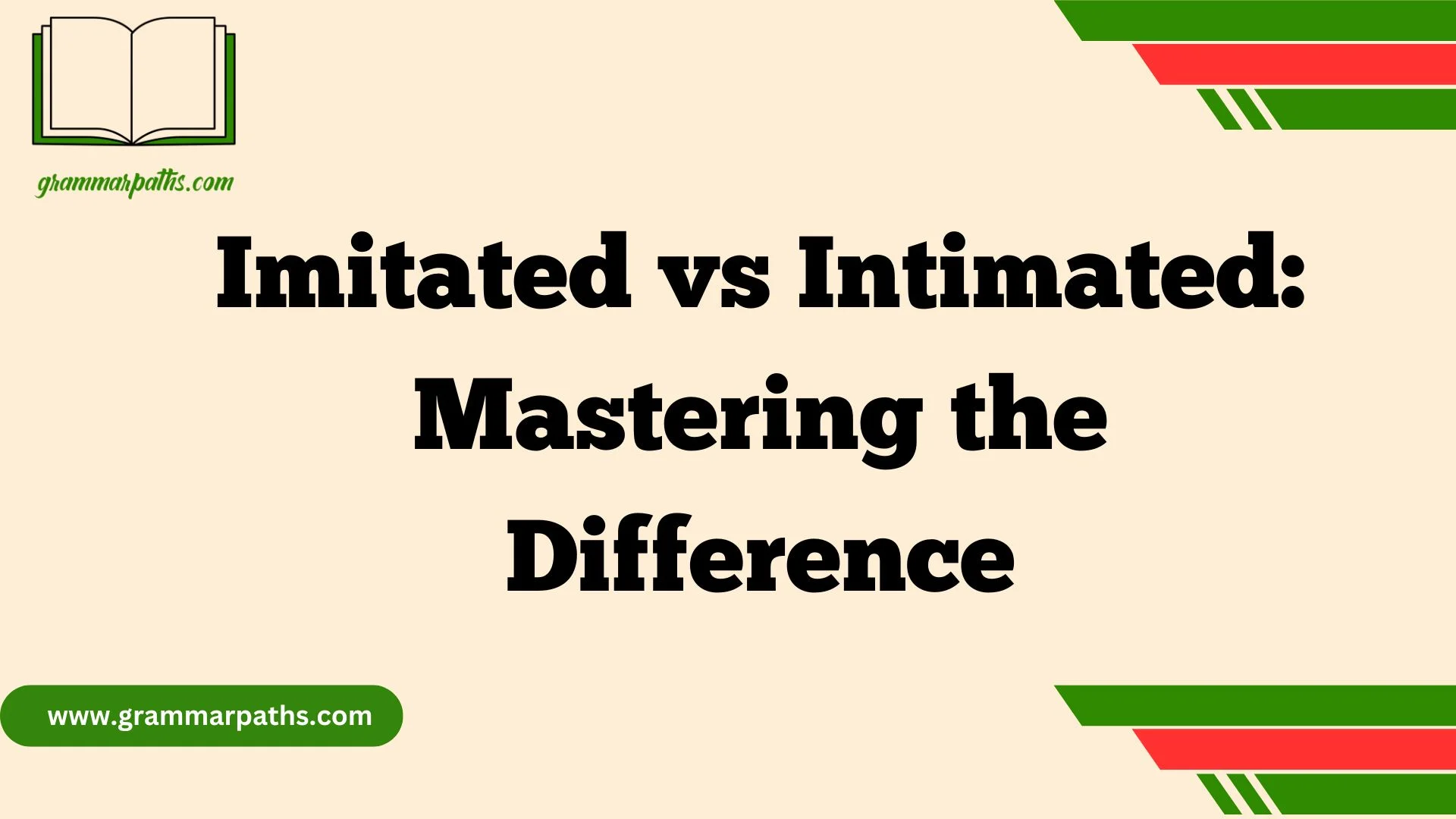Understanding the difference between “Imitated” vs “Intimated” is essential for clear and accurate communication. Though these words sound somewhat similar, they carry very different meanings, and using one in place of the other can lead to confusion. Imitated refers to copying someone’s behavior, style, or appearance, often with the intent to replicate or mimic. For example, a child may have imitated their parent’s tone of voice. On the other hand, intimated means to suggest, hint, or imply something subtly—it’s about communicating indirectly rather than copying.
These terms belong to the category of commonly confused English words, especially in writing and speech. Both are past tense verbs, but their root meanings come from completely different origins: one from mimicry and the other from suggestion or indication. If you’ve ever misused a word in context, you’re not alone—English is full of such tricky pairs.
In this guide, we’ll break down the definitions, provide clear usage examples, and offer tips to remember which word to use when. Mastering the subtle differences between imitated vs intimated will boost your writing clarity and linguistic confidence.
What Does “Imitated” Mean?
Imitated is the past tense of imitate, which means “to copy, mimic, or reproduce.” When you imitate someone or something, you’re replicating behavior, appearance, sound, or style.
- Etymology: From Latin imitārī (“to copy”), passing into Middle English via Old French imiter
- Part of Speech: Verb (transitive)
- Pronunciation: /ˈɪm.ɪ.teɪ.tɪd/
Common Uses
- Behavioral mimicry:
- “The parrot imitated the baby’s giggle.”
- “The parrot imitated the baby’s giggle.”
- Artistic reproduction:
- “He imitated Van Gogh’s brush strokes in his own painting.”
- “He imitated Van Gogh’s brush strokes in his own painting.”
- Accents and voices:
- “She imitated her favorite movie star so well everyone laughed.”
- “She imitated her favorite movie star so well everyone laughed.”
Synonyms
- Mimicked
- Copied
- Replicated
- Emulated
Quick Facts
- According to Google Ngram Viewer, “imitated” appears roughly 12 per million words in published English texts, indicating moderate usage in both formal and informal contexts.
- In everyday speech, you’ll often hear “copycat” or “do a spot-on impression” as colloquial equivalents.
What Does “Intimated” Mean?
Intimated is the past tense of intimate, which—contrary to one’s first guess—does not mean “to intimidate.” Instead, it has two primary senses:
- To hint or suggest subtly
- To announce or make known formally
- Etymology: From Latin intimāre (“to make known, to hint”), derived from intimus (“inmost”)
- Part of Speech: Verb (transitive)
- Pronunciation: /ˈɪn.təˌmeɪ.tɪd/
Dual Meanings in Context
| Meaning | Example Sentence |
| To hint or imply | “She intimated that the meeting would end early.” |
| To announce or disclose formally | “The report intimated the company’s new strategy.” |
Common Confusions
- Not “intimidated”: Don’t confuse with “intimidate,” which means to frighten.
- Not “initiated”: Nor with “initiate,” meaning to begin.
Quick Facts
- In professional writing, “intimated” often shows up in legal, corporate, or formal notices.
- Usage frequency is lower than “imitated”—around 3 per million words in published sources.
Side-by-Side Comparison
| Feature | Imitated | Intimated |
| Core Meaning | To copy or reproduce | To hint/suggest or formally announce |
| Etymology | Latin imitārī (“to copy”) | Latin intimāre (“to hint/make known”) |
| Pronunciation | /ˈɪm.ɪ.teɪ.tɪd/ | /ˈɪn.təˌmeɪ.tɪd/ |
| Common Context | Arts, behavior, speech | Corporate announcements, subtle suggestions |
| Synonyms | mimicked, emulated, replicated | hinted, implied, disclosed |
| Frequency (N-gram) | ~12 occurrences per million words | ~3 occurrences per million words |
Why People Confuse “Imitated” and “Intimated”
- Phonetic Similarity
Both words share four of five letters in the same order, differing only by that one “n” sound:
- IMITated vs. INTIMated
- IMITated vs. INTIMated
- Typing & Autocorrect Errors
Mobile keyboards often correct one to the other when you type quickly. - ESL Challenges
Learners of English frequently mix up these near-homographs, especially when relying on sound rather than spelling. - Cognitive Shortcuts
Our brains sometimes focus on familiar chunks (“imit-”) and gloss over smaller distinctions.
Real-World Case Studies: Misuse & Correction
Case Study 1: Corporate Email Blunder
Email Received
“As the CEO imitated the plan in yesterday’s press release…”
- Issue: The writer meant “intimated” (hinted at), not “imitated” (copied).
- Impact: Stakeholders assumed the CEO was plagiarizing a competitor’s strategy.
Corrected Version
“As the CEO intimated the plan in yesterday’s press release, we expect questions at the town-hall meeting.”
Case Study 2: Social Media Slip
Tweet
“He intimated my accent so well I couldn’t tell it was him.”
- Issue: Should be “imitated,” since the act was copying a voice, not hinting.
- Lesson: Context matters—if you’re copying something outwardly, reach for “imitate.”
How to Remember the Difference
- Visual Mnemonic
- Imitate → Mirror (both start with “mi”)
- Intimate → Inkling (both share an “i” and hint at something underneath)
- Imitate → Mirror (both start with “mi”)
- Phrase Hook
“You imitate actions; you intimate intentions.” - Flashcard Drill
- Front: “To suggest subtly” → Back: “Intimate”
- Front: “To copy exactly” → Back: “Imitate”
- Front: “To suggest subtly” → Back: “Intimate”
Using Each Word Correctly in Writing
- Formal vs. Informal
- Imitated works in any register (academic, casual, creative).
- Intimated skews formal or literary—you’ll see it in reports, novels, or legal docs.
- Imitated works in any register (academic, casual, creative).
- Common Collocations
- Imitated accent, imitated behavior, imitated design
- Intimated that…, intimated concerns, intimated approval
- Imitated accent, imitated behavior, imitated design
Grammar Tips
- Keep tense consistency:
- Right: “She imitated him yesterday and has imitated him again today.”
- Wrong: “She imitates him yesterday…”
- Right: “She imitated him yesterday and has imitated him again today.”
- Pair with clear objects:
- “He imitated the signature.” (what was copied?)
- “They intimated their departure.” (what was suggested?)
- “He imitated the signature.” (what was copied?)
Related Confusing Word Pairs
| Word Pair | Difference in Brief |
| intimated vs intimidated | Intimated = hinted; Intimidated = frightened |
| intimated vs initiated | Intimated = hinted; Initiated = began |
| imitated vs mimicked | Imitated = copied broadly; Mimicked = copied very precisely |
Summary: Key Takeaways
- Imitated means to copy. Picture a mirror.
- Intimated means to hint or announce. Picture a whisper.
- That extra “n” in intimated stands for a nuance or nudge.
- When in doubt, ask: “Am I talking about copying something, or hinting at something?”
“Precision in language reflects precision in thought.”
— Linguist David Crystal
FAQs
What is the difference between intimidate and imitate?
Intimidate means to frighten or threaten someone into doing something.
Imitate means to copy someone’s behavior, style, or actions.
What does it mean to be intimated?
To be intimated means to be made aware of something subtly or indirectly.
It can also be mistakenly used when someone means “intimidated,” meaning to feel afraid or pressured.
What does it mean to be imitated?
To be imitated means someone is copying your actions, style, or behavior.
It can be flattering, mocking, or for learning purposes.
What is the difference between imitation and identification?
Imitation is copying someone’s behavior, often for learning or flattery.
Identification is feeling a sense of connection or sameness with someone or something.
What is the alternative of intimate?
An alternative to intimate (meaning close or personal) is close, dear, or affectionate.
If using intimate as a verb (“to suggest”), alternatives include imply, hint, or suggest.
What is the same as imitate?
Words similar to imitate include copy, mimic, emulate, and replicate.
These all involve reproducing someone else’s actions or style.
Does intimate have two meanings?
Yes, intimate can be an adjective meaning “close and personal,” or a verb meaning “to suggest indirectly.”
Conclusion:
In conclusion, understanding the distinction between “Imitated” vs “Intimated” is vital for anyone looking to improve their written and spoken English. Though they may sound somewhat alike, these two words serve entirely different purposes. Imitated is all about copying behavior, style, or actions, often used when someone tries to replicate another person. In contrast, intimated refers to subtly hinting, implying, or suggesting something without stating it outright.
Misusing these words can lead to miscommunication, especially in professional writing, emails, or academic work. By taking the time to recognize the unique meaning and contextual use of each term, you’ll avoid common grammar mistakes and enhance the clarity of your language.
To sum it up: if you’re talking about mimicking, go with imitated. If you’re referring to a hint or indirect communication, choose intimated. Simple memory tricks, like linking “imitated” with “imitate” and “intimated” with “hinted,” can help you remember.
Continue practicing with real-world examples and reading widely to reinforce your understanding. With consistent effort, you’ll grow more confident in using even the most confusing English word pairs like these with precision and ease.

Mia Rose is the passionate writer and founder of GrammarPaths.com, a resource dedicated to helping learners master English grammar, idioms, and writing skills with ease. With a deep love for language and years of experience in teaching and content creation, Mia simplifies complex grammar rules into clear, practical guides that readers can instantly apply.












